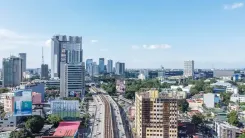What Steps is the South Korean Government Taking to Address the US Visa System After the Georgia Detention?

Synopsis
Key Takeaways
- Task Force Formation: Initiated to support South Korean companies with US visa challenges.
- Human Rights Concerns: Investigating potential violations during the detention of workers.
- Industry Involvement: Collaboration with key business lobbies and ministries.
- Proposal for Reform: Aiming to address the complexities of the US visa application process.
- Commitment to Citizens' Rights: Ensuring the dignity of South Koreans is upheld.
Seoul, Sep 18 (NationPress) The South Korean government has initiated an interagency task force on Thursday aimed at assisting South Korean businesses in navigating the US visa system for work-related travel. This action follows the detention and subsequent release of over 300 South Koreans during a recent US immigration operation, as reported by the foreign ministry.
The task force, which includes members from the Ministry of Foreign Affairs, the Ministry of Industry, Trade and Energy, the Ministry of SMEs and Startups, and others, is set to gather feedback from various sectors regarding the challenges they face when traveling to the United States for work. The aim is to formulate effective responses, according to Yonhap News Agency.
Prominent South Korean business organizations, including the Federation of Korean Industries, will also participate in this task force.
This initiative comes in response to increasing demands for improved visa guidelines for South Korean firms engaged in significant manufacturing projects in the US, especially after the mass detention of South Korean nationals raised concerns about the clarity of US visa policies.
Many of those detained were in the US on short-term business or leisure visas. Companies have raised concerns that the lengthy visa application process and vague visa regulations hinder their operations within the country.
Officials intend to propose reforms to the US government based on the findings of this task force.
On September 15, South Korea's Presidential Office announced an investigation into any potential human rights violations that may have occurred during the raid and detention of Korean workers by US immigration authorities in Georgia.
A total of 316 South Koreans returned home after spending a week in detention following a US immigration raid at an electric vehicle battery facility in Bryan County, following intense negotiations between Seoul and Washington.
Local media have reported numerous firsthand accounts from the detention, with many describing the conditions as overcrowded, unhygienic, and severe.
The detained workers recounted experiences of cramped quarters, moldy mattresses, cold environments, and limited access to basic hygiene. Several workers reported being shackled during their arrest and mistreated by immigration officers.
"I understand that the government is conducting a more thorough review with the companies to determine whether any human rights violations occurred," stated presidential spokesperson Kang Yu-jung in a press briefing.
"The foreign ministry is investigating whether our demands were adequately addressed, and companies are also reviewing their processes to determine if any shortcomings exist on either the Korean or US side," Kang added.
Seoul emphasized that the rights and dignity of South Korean citizens must not be unjustly compromised, expressing considerable regret to Washington over the incident.
"Some of our requests have been accepted, leading to improvements. However, we will continue to investigate whether any issues or inconveniences for our citizens persist," she concluded.
Hyundai and LG, the two South Korean companies involved in the joint venture site that was raided, are collecting testimonies from workers regarding possible discrimination, mistreatment, or violations of rights, and will share the findings with the foreign ministry, according to a ministry representative.
"A comprehensive investigation will be conducted to verify any potential human rights abuses during the detention, and the matter will be addressed with the US if necessary," officials indicated.








